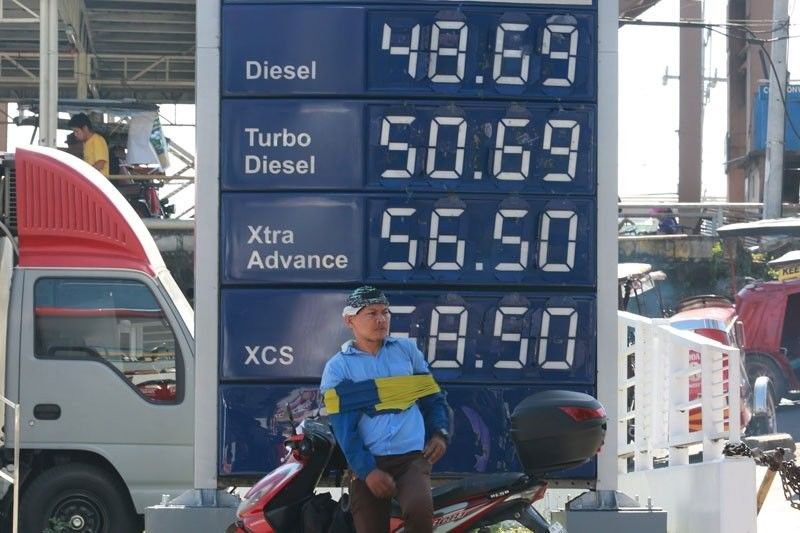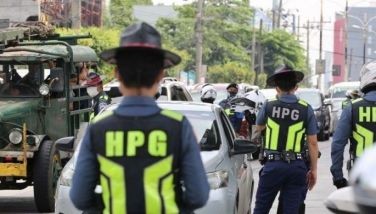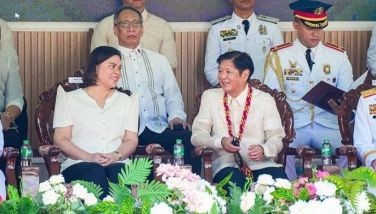House panel tackles scrapping of fuel tax hike

MANILA, Philippines — Lawmakers yesterday began tackling measures scrapping taxes on oil products or at least suspending some of them, with opposition Rep. Edcel Lagman warning of street riots similar to those ignited in Paris by rising fuel taxes.
“We should not wait for a similar French experience. The French government was forced to suspend its fuel tax hikes because of violent riots. We should be able to avert that situation,” Lagman said.
The House ways and means committee, chaired by Nueva Ecija Rep. Estrellita Suansing, started yesterday deliberations on seven measures aimed at scrapping or suspending fuel excise tax increases under the Tax Reform for Acceleration and Inclusion (TRAIN) law.
He said the House and the Senate should pass a joint resolution forgoing next year’s increase in taxes on diesel, cooking gas, gasoline, kerosene and other oil products.
Lagman said that while inflation had eased to six percent last month, the rate was still the highest among countries belonging to the Association of Southeast Asian Nations (ASEAN).
“The closest to us is Vietnam, where inflation is 4.5 percent. The rest of ASEAN is below two percent,” he added.
On Tuesday evening, President Duterte and his Cabinet agreed to push through with next year’s increase despite a previous decision to forgo it.
The panel created a technical working group (TWG) to consolidate the measures.
Lagman said the referral to a TWG “is an indication of the committee’s inclination to endorse the proposal to suspend next year’s fuel tax increase.”
“A TWG is created usually when there is consensus to recommend the course of action the pending bills are seeking,” he said.
The Albay congressman and his opposition colleagues authored a joint resolution suspending the 2019 adjustment.
Marikina Rep. Romero Quimbo and members of his Liberal Party bloc are the authors of a bill scrapping levies on diesel and kerosene.
Answering questions from Quimbo, Finance Assistant Secretary Ma. Teresa Habitan said the Bureau of Internal Revenue and the Bureau of Customs have reported collections of nearly P70 billion in fuel taxes from January to October this year.
Of that amount, she said P37.2 billion, or more than half, represented increases imposed under the controversial TRAIN law.
She said the Department of Finance is confident of attaining its P53.7-billion revenue target this year from TRAIN.
She added that suspending next year’s increase would mean a P40-billion revenue loss.
Habitan also said out of this year’s P37.2-billion collections from TRAIN taxes, P18.3 billion came from gasoline, P10.7 billion from diesel and P258 million from kerosene.
Based on the DOF data, Quimbo remarked that the government could afford to suspend levies on diesel and kerosene since these two oil products account for a small part of incremental revenues.
Rep. Tom Villarin of Akbayan said the decision of the President and his Cabinet to push through with the 2019 fuel tax increase would “trigger an inflationary push.”
“It is clear that inflation was caused by these excise taxes, not because of increases in pump prices of oil,” he said.
Bayan Muna Rep. Carlos Zarate said the decision “will definitely jack up prices anew because the excise tax on diesel and bunker fuel will jump to P4.50 liter from P2.50, while gasoline will have a P9 per liter tax or a P2 increase.”
“The Duterte administration, instead of heeding the strong clamor of our people to abolish the regressive taxes brought by TRAIN, is again gambling with the prices of goods with the continued implementation of the TRAIN law, and this would definitely hit our consumers hard,” he said.
‘Premature’
For Sen. Risa Hontiveros, President Duterte’s decision to proceed with the collection of the second round of excise tax on petroleum was “premature and impulsive.”
Hontiveros said the decision has exposed the government’s “wobbly policy” in dealing with the negative impact of unstable oil prices on consumers.
“President Duterte claimed that we are powerless to respond to the impact of the rise of oil prices in the world market. He also said that we are at the mercy of the international oil market,” she said. “Then why lift the suspension on the fuel excise tax collection, one of the few safety nets that protect the public from the volatility of the international oil market?” Hontiveros asked.
“If the government failed to foresee the depth and gravity of the impact of volatile international oil prices on our inflation rate, what makes it think that the overall economic environment is turning around for the better? Isn’t it more prudent to continue to allow the safety nets, such as the suspension of the fuel excise tax, to take full effect to shelter the people in an uncertain economic climate?” Hontiveros said.
The senator said that there is solid basis to suspend the second round of excise tax on petroleum. She explained that value added tax (VAT) revenues from various petroleum products have risen and have exceeded projected revenues for 2018.
She also argued that despite the series of oil price rollbacks, the peso cost of petroleum products has been and remains quite high as a result of the depreciation of the peso and the still high international price of petroleum products.
“During the Oct. 24 hearing of the Senate committee on economic affairs, the Department of Finance (DOF) admitted that the excess in VAT revenues is indeed substantial. Why then collect more indirect tax revenues via the petroleum industry?”
For 2019, Hontiveros estimated that excess VAT collection would probably be around P10 billion given the lower expected oil prices.
She also said that the windfall revenue from the VAT on transactions related to high-priced petroleum was never contemplated when the TRAIN law was passed.
“What our economic managers should do is defer the second round of excise tax on petroleum. The deferment will be for as many months as necessary to return and neutralize the unintended 2018 and 2019 VAT collections on petroleum-related transactions,” Hontiveros said.
Inflation, not crude cost
Sen. Paolo Benigno Aquino IV said there is no basis for the government to take back its previous commitment to suspend the tax hike.
Aquino said the six percent inflation showed the country was still in the “middle of a crisis of high prices, so this decision to add to existing excise tax is wrong.”
He said the government should have based the suspension of excise tax on fuel on the inflation rate and not on world crude prices.
Sen. Francis Escudero, for his part, filed a resolution formally asking Duterte to suspend the P2 per liter increase or at least consider its immediate suspension when inflation becomes uncontrollable again any time in 2019.
“It is best to suspend the implementation of the second tranche of fuel excise tax right away or that the suspension be swift in 2019 so as to effectively address inflation, before it again directly affects the lives of every Filipino,” Escudero said in Senate Resolution 964.
Sen. Joseph Victor Ejercito told reporters “we’re hoping for some sensitivity on the part of the economic managers, who should allow our countrymen to have some breathing space (from high prices).”
“During the TRAIN debates, it’s on record that we were not remiss in reminding them of the possible increase in oil prices,” he said.
Senate President Pro Tempore Ralph Recto said that while inflation has gone down to six percent, “it’s still high” and could inflict more hardship on consumers if taxes on petroleum are raised further.
“If the executive increases taxes on oil next year it clearly will increase prices and stoke inflation,” he said.
Sen. Sonny Angara said the government must fulfill its promise to implement safety nets for the poor to mitigate the effects of TRAIN.
The lawmaker was referring to the unconditional cash transfer and Pantawid Pasada programs, which were provided as “social welfare benefits” under the tax reform law. – Cecille Suerte Felipe
- Latest
- Trending































